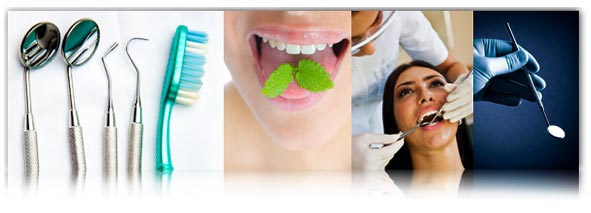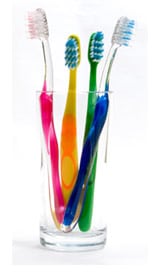
Dental hygiene or oral hygiene is the process of maintaining proper dental care to avoid oral health problems.
It is recommended that you see your dentist and dental hygienist at least twice a year, however, the dental care that you provide on your own in-house is an integral part of maintaining good oral health.
A good in-house regimen supplemented by regular dentist check-ups and cleanings is the best way to prevent dental emergencies.
Oral Hygiene Guidelines

Brushing with fluoride toothpaste is recommended at least twice a day to remove plaque and the remnants of food and drink from our teeth and gums.
Flossing once a day is an essential practice to avoid gum disease and preventing tooth decay.
An oral rinse also helps promote good oral hygiene as it will reduce oral discomfort, provide moisture to oral tissues and help with bad breath.
More therapeutic oral rinses can be anti-plaque, anti-cavity, anti-tarter, and anti-bacterial and are all good at preventing oral health problems. Ask your dentist what he/she recommends for you.
Practicing the above oral hygiene habits are great ways to maintain proper oral health however good habits alone will not remove all the plaque that builds up over time.
This is why it is necessary to see your dentist and dental hygienist regularly to remove the plaque to lower your risk of toothaches, cavities, periodontal disease or even the loss of all your teeth.
By removing plaque you reduce your chances of needing root canals, tooth extractions, dental bridges, crowns and more.
Your dentist and dental hygienist will ensure that you will receive the necessary treatment to maintain the good oral health of your teeth, mouth, and gums and keep you smiling.
Pediatric Dentistry: Oral Hygiene for Children
Children also need to be guided with their oral health care techniques and their parents should be informed of how to help them accomplish this goal.
Cavities are the most common childhood ailment and can be prevented with proper oral health care and preventative measures.
Kids should therefore not be free to eat whatever they please as they tend to be attracted to sweet and sugary foods that can cause tooth decay.
These substances are more difficult to clean off of children’s teeth and can result in the accumulation of plaque and cavities.
Even though children’s teeth eventually fall out and are replaced with permanent teeth they are an important part of a child’s overall oral health and development.
Oral Hygiene Guidelines for Children and Babies
Baby Teeth- An infant’s teeth should be cleaned as soon as they erupt, typically within the first six months of age.
Although you should consult with your dentist regarding how to clean their teeth, you can use a small washcloth or gauze after every feeding.
When multiple teeth erupt, you can soak a child appropriate toothbrush in warm water and use it on your baby’s teeth.
Children’s Teeth- Your child’s teeth should be cleaned by the parent or provider until the child is coordinated enough to do it themselves.
It is important that your child see a dentist by age one to establish a dental plan and to get professional and periodic cleanings.
Flossing- Flossing can begin when two teeth have erupted next to each other.
Children should floss on their own daily when they are coordinated to do it on their own, usually around the age of six.
Mouth Rinse- Children can use a mouth rinse when they are ready to take on the responsibility, although this is recommended by age seven.
Orthodontic Treatment- Once all the adult teeth have erupted a dentist can recommend if your child should consult with an orthodontist to receive braces.
Generally by age seven braces may be an appropriate solution for proper teeth alignment. Your orthodontist may be able to tell you if your child may suffer from a bad bite or may have issues with poorly aligned teeth.
Poor Oral Hygiene
Neglecting to adhere to proper oral hygiene guidelines can lead to further oral health complications that are much easier to prevent than they are to fix.
Improper dental hygiene results in increased accumulation of plaque and debris around the mouth, teeth, and gums that can lead to gum disease.
Gum disease or periodontal disease is an infection of the tissues and bones that surround and support the teeth.
When plaque accumulates in your mouth the bacteria make poisons, or toxins, that irritate the gums and cause the gum tissues to break down.
If you don’t do a good job of removing plaque from your teeth by brushing and flossing, it can spread below the gums and damage the bone that supports the teeth.
With time, the plaque hardens into a substance called tartar that has to be removed by a dentist or dental hygienist.
Gum disease is a direct result of poor dental hygiene and is preventable. If not detected early the condition of gum disease can lead to tooth abscess or tooth loss.
Your gums will turn red and puffy and may bleed every time you brush. Gum disease can also lead to halitosis (bad breath), gingivitis, tooth decay, or teeth that are loose or appear to have shifted.
To prevent the occurrences of gum disease or tooth decay the surfaces and areas between the teeth and under the gum line must be maintained and treated on a regular basis in order to ensure proper dental hygiene.
These areas are still in need of professional dental care even if you regularly care for your teeth.
Allowing your dentists and dental hygienist to perform professional teeth cleanings means that they will be able to remove tartar from your teeth, check for other issues associated with oral health and prevent them, and identify other potential problems.
Regular visits to your dentists are a good way to prevent oral health problems and should occur at least two times a year.
